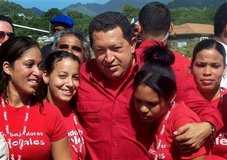Med anledning av den uppblossande konflikten i Georgien hörs många åsikter om Ryssland. Sverige är visserligen ännu inte NATO-medlem men våra massmedier har duktigt "NATO-anpassat" sig och försöker spela på den gamla ryss-skräcken. På vänsterkanten köper inte alla den massmediala bilden. Men ändå är det få som inser vikten av ett stark självständigt Ryssland. Bristen på geopolitisk analys är påtaglig. I en värld där USA försöker upprätta något som närmast liknar en världsdiktatur är det centralt att stater som Ryssland och Kina växer sig starkare. Det öppnar möjligheter för andra att hävda sin självständighet. Ett exempel är Venezuela.
Venezuelan President Hugo Chavez, visiting Moscow to pursue weapons and energy deals, on Tuesday called for a strategic alliance with Russia to protect his country from the United States.
Chavez has repeatedly accused Washington of plotting an invasion to destabilize his government, despite U.S. denials.
The alliance would mean "we can guarantee Venezuela's sovereignty, which is now threatened by the United States," Chavez told reporters shortly after his arrival in Moscow.
Chavez is in Russia to broker a number of deals involving weapons purchases, oil exploration and possibly the creation of a joint financial institution.
Västimperialisterna älskade naturligvis 90-talets Ryssland. Miljoner ryssar på svältgränsen. Massmedia och naturtillgångar kontrollerade av maffia-oligarker. Ett försvar i förfall.
Idag har Ryssland styrka att våga värna självständighet. Det ska ryssarna och alla andra vara tacksamma för.
SvD,SvD,AB,DN

